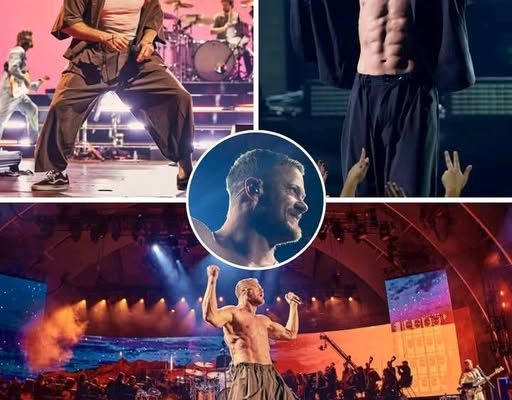Under the glowing California night sky, the Hollywood Bowl transformed into a cathedral of sound and emotion as Imagine Dragons delivered a soul-stirring performance of their hit “Demons.” It was not just another concert on their “Loom World Tour,” but a deeply human moment—an emotional communion between band and audience that reminded everyone why music, at its purest, can be both a mirror and a medicine for the soul. Fans had come expecting power, fireworks, and hits. What they received instead was something even more profound: healing through vulnerability, light through darkness, and connection through song.
From the opening moments of the show, it was clear that this night was going to be different. The Bowl, known for its open-air acoustics and starry atmosphere, pulsed with anticipation. As the stage lights dimmed and the massive LED backdrop began to shimmer with soft hues of gold and violet, frontman Dan Reynolds appeared, barefoot, his silhouette projected in gentle light. When the first haunting notes of “Demons” began to echo, a hush swept through the crowd—a collective breath held in reverence.
Reynolds’ voice, raw and trembling with emotion, carried across the amphitheater with a sincerity that cut straight to the heart. It wasn’t just a performance; it was a confession. Every lyric seemed to weigh heavy, as if he was reliving the very pain that inspired the song years ago. “When the days are cold, and the cards all fold…” he began, his tone intimate, vulnerable, and painfully real. Fans sang along quietly, not shouting the words, but whispering them—each person clinging to their own private memories, their own inner demons.
Behind him, the rest of the band—Wayne Sermon on guitar, Ben McKee on bass, and Daniel Platzman on drums—played with restraint and purpose. The arrangement was stripped back, almost cinematic, emphasizing the delicate balance between melancholy and hope that “Demons” embodies. As the chorus built, Reynolds closed his eyes, his voice cracking slightly on the line, “Don’t get too close, it’s dark inside.” The moment was not one of weakness, but of truth. The Hollywood Bowl was silent except for the sound of thousands breathing in unison, caught in the gravity of the moment.
Imagine Dragons have always been known for their grand, explosive anthems—songs that fill arenas and lift spirits. But in “Demons,” the band reveals a quieter power: the courage to confront fragility. And on this night, under the stars, that courage was contagious. Reynolds paused after the final note, visibly emotional, as the audience erupted into a standing ovation that seemed to last an eternity. He wiped away a tear and spoke softly into the microphone. “This song saved my life,” he said, his voice barely above a whisper. “It reminds me that we all have something we’re fighting. But tonight, you’re not alone in that fight.”
It was the kind of statement that resonated deeply with those who have followed the band’s journey over the past decade. Since their early success with “It’s Time” and the global domination of “Radioactive,” Imagine Dragons have evolved from chart-topping hitmakers into emotional storytellers, unafraid to explore themes of mental health, self-doubt, and healing. Their frontman has often spoken openly about his own struggles with depression and anxiety, using his platform to spark conversations that break the silence around mental health. At the Hollywood Bowl, that mission felt more personal than ever.
The “Loom World Tour” has been celebrated not only for its production and scale but also for its intimacy—a delicate balance of spectacle and sincerity. The Hollywood Bowl show captured that perfectly. The stage design resembled a massive woven tapestry of light, symbolizing connection and the interlacing of human experiences. As the band transitioned into other hits like “Whatever It Takes,” “Believer,” and “Thunder,” the energy surged, yet the emotional core remained grounded. Every song seemed to tell a story about endurance and transformation, about finding beauty in brokenness.
The crowd was a sea of lights—fans holding up their phones not to record, but to illuminate, creating a galaxy of tiny stars within the Bowl. The visuals behind the band shifted between ethereal landscapes and intimate close-ups, blending technology and emotion in perfect harmony. But nothing could match the authenticity of Reynolds’ interactions with the audience. Between songs, he took time to speak—not as a performer, but as a friend. He talked about family, about loss, about the quiet battles we fight when no one’s watching. His openness invited others to be open too.
Midway through the set, Reynolds shared a moment that would become the emotional centerpiece of the night. He recounted how “Demons” was written during one of the darkest periods of his life, a time when he questioned his worth and purpose. “Music became my lifeline,” he said. “It was the way I told the truth when I didn’t have the words.” Then, without warning, he began an impromptu acoustic reprise of “Demons,” just his voice and an acoustic guitar. The audience joined in, their collective singing soft but powerful, a choir of thousands offering solidarity and love.
It was a moment of unity that transcended the boundaries of performer and fan. Strangers held hands. Some wept. Others smiled through tears. It wasn’t about perfection—it was about connection. And in that connection, the Bowl felt less like a concert venue and more like a sanctuary.
As the night continued, the tone shifted from introspection to triumph. Songs like “On Top of the World” and “Walking the Wire” brought an eruption of joy, as if the audience had collectively emerged from the shadows of “Demons” into the light of healing. Reynolds danced barefoot across the stage, laughter replacing the earlier tears, his energy contagious. The transition felt symbolic—a reminder that pain and joy are not opposites, but parts of the same human experience.
By the time the encore arrived, the Hollywood Bowl was alive with emotion. The band returned for a finale that included “Enemy” and the anthemic “Radioactive,” both delivered with ferocious passion. But even in their loudest moments, there was still that undercurrent of meaning—a sense that every drumbeat and lyric was a celebration of survival. When the final echoes faded and confetti drifted into the night sky, Reynolds bowed deeply, his gratitude palpable.
“You have no idea how much this means to us,” he said, scanning the sea of faces. “You’ve given us your hearts tonight. And I promise, we’ll carry that with us wherever we go.” The audience responded with thunderous applause, but also with a kind of quiet understanding. Everyone knew they had witnessed something more than just a concert.
As fans filed out into the cool Los Angeles night, there was a lingering warmth—a collective sense of peace. The echoes of “Demons” seemed to follow them, not as a haunting, but as a reminder that facing your darkness can lead you to the light. The Hollywood Bowl, steeped in music history, has seen countless legendary performances, but this one felt uniquely personal. Imagine Dragons didn’t just perform—they shared, they healed, and they reminded the world of the power of empathy in art.
For many, this show solidified why Imagine Dragons remain one of the most beloved and enduring bands of their generation. Their sound continues to evolve, but their message remains timeless: vulnerability is strength, and music can mend even the deepest wounds. In an age where spectacle often overshadows sincerity, Imagine Dragons dared to lead with heart.
As the final lights dimmed and the stars reclaimed the sky above the Bowl, one couldn’t help but feel changed. Maybe that’s the true magic of Imagine Dragons—not the pyrotechnics or the anthems, but the way they make every person in the crowd feel seen. That night, as “Demons” echoed softly in memory, it was clear that the Loom World Tour wasn’t just about music. It was about healing. About coming together. About remembering that even in our darkest moments, we are never truly alone.



